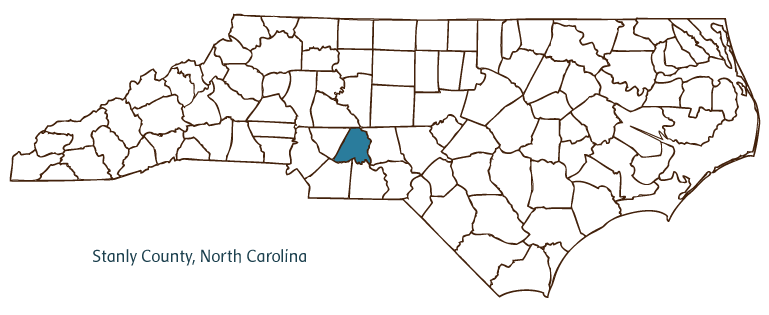Stanly County Resources
- View All:
- Biographies
- Monuments
- locations
ANCHOR (A North Carolina History Online Resource) is now its own website!
Copyright Notice: This article is from the Encyclopedia of North Carolina edited by William S. Powell. Copyright © 2006 by the University of North Carolina Press. Used by permission of the publisher. For personal use and not for further distribution. Please submit permission requests for other use directly to the publisher.

Stanly County, located in the Piedmont region of North Carolina, was formed in 1841 from Montgomery County and named for John Stanly, a Speaker of the North Carolina House of Commons and, later, a U.S. congressman. Early inhabitants of the area included the Saura (Cheraw), Keyauwee, and Tuscarora Indians, followed by German, Dutch, Scotch-Irish and English settlers. Albemarle, the county seat, was incorporated in 1857 and named for George Monck, the duke of Albemarle and one of the Lords Proprietors. Other communities in the county include Badin, Misenheimer, Richfield, New London, Locust, Stanfield, and Lambert. The Yadkin-Pee Dee River, Badin Lake, the Uwharrie Mountains, Morrow Mountain, and Little and Cucumber Creeks are a few of Stanly County's significant physical features.
Pfeiffer University, which was founded in 1885, is located in Stanly County. The county also has a variety of historic landmarks, such as the "City of Albemarle" Antique Fire Engine (1922), the Hall House (1912), and the Albemarle Town Cemetery (1844). Cultural attractions include the Stanly County Museum, the Morrow Mountain State Park and Museum, and the Uwharrie Players theater company. The county hosts annual events and festivals such as the Best of Badin Festival, Oktoberfest, the Norwood Arbor Day Festival, Beach Blast, Festival of Trees, and Downtown Albemarle Christmas.
Stanly County produces agricultural goods such as corn, soybeans, wheat, cotton, forage, and cattle and other livestock. Manufactured products include yarn, aircraft tires, ladies knitwear, manufactured homes, draperies, popcorn, and circuit breakers. Gold has also historically been mined in Stanly County. The Barringer Mine (1829) introduced subsurface gold mining to North Carolina. In 2004 the county's population was an estimated 59,000.
For an annotated history of the county's formation, with the laws affecting the county, boundary lines and changes, and other origin information, visit these references in The Formation of the North Carolina Counties (Corbitt, 2000), available online at North Carolina Digital Collections (note, there may be additional items of interest for the county not listed here):
County formation history: https://digital.ncdcr.gov/Documents/Detail/the-formation-of-the-north-ca...
Index entry for the county: https://digital.ncdcr.gov/Documents/Detail/the-formation-of-the-north-ca...
References:
Ivey Lawrence Sharpe and Edgar Pepper Fletcher III, Stanly County, USA: The Story of an Area and an Era, 1841-1991 (1990)
Additional resources:
Corbitt, David Leroy. 2000. The formation of the North Carolina counties, 1663-1943. https://digital.ncdcr.gov/Documents/Detail/the-formation-of-the-north-carolina-counties-1663-1943/3692099?item=4553233 (accessed June 20, 2017).
Stanly County Government: https://www.stanlycountync.gov/
Stanly County Chamber of Commerce: https://stanlychamber.org/
DigitalNC, Stanly County: https://www.digitalnc.org/counties/stanly-county/
North Carolina Digital Collections (explore by place, time period, format): https://digital.ncdcr.gov
Image credits:
Rudersdorf, Amy. 2010. "NC County Maps." Government & Heritage Library, State Library of North Carolina.
Mazzocchi, Jay. "Stanly County." NCpedia. State Library of NC. 2006. https://www.ncpedia.org/geography/stanly.